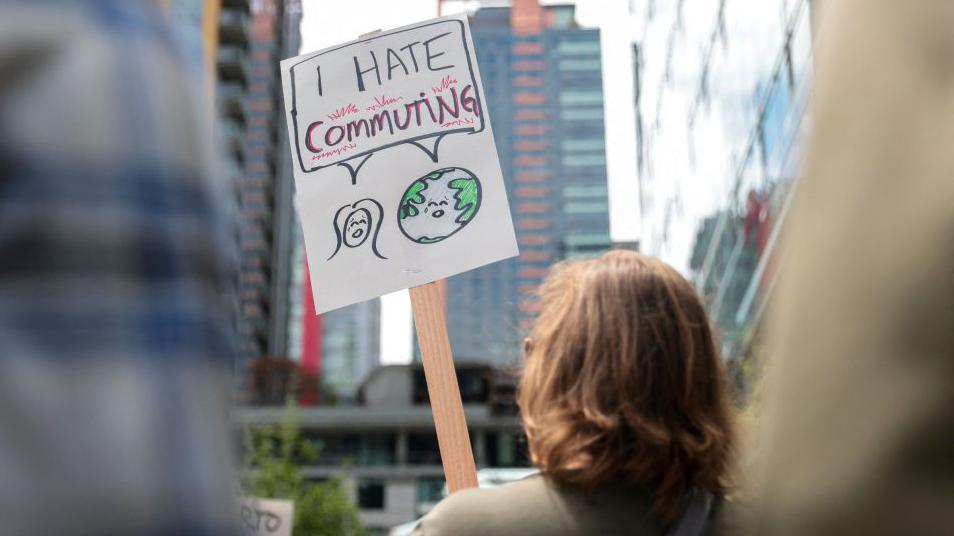Should working from home staff go to the office?
People in Cardiff share their opinions on working from home
- Published
"You are a character in the office in a way perhaps you can never be at home."
Natalie Brain, a team leader in the sales department of the finance firm Creditsafe, sums up feeling liberated by returning to her office in Caerphilly, rather than working from home (WFH).
More than four years after the pandemic began, working from home remains a divisive issue - some felt freed by cutting out the commute, but others felt trapped, unable ever to get away from the job.
The body representing call centres in Wales said many employers were now moving to formalise two or three days a week in the office, but unions warned of disputes because WFH had been "transformational" for workers.

"When I come here, I can walk out of the door and then I am in my personal life," says Natalie Brain of Creditsafe
Creditsafe, which employs about 250 people, returned to a five-day week in the office as soon as it could after Covid restrictions were eased.
It suited the noisy, high-energy, atmosphere in an office where loud music plays and staff are encouraged to ring a bell to cheers when a sale is completed.
The train service that is mimicking London's Tube
- Published31 May 2024
Will staff ever return to the office full-time?
- Published28 February 2022
Offices must encourage staff back, says firm
- Published24 February 2022
"The difference was massive," said Natalie.
"I think especially with sales people, there are big personalities and when they do not have a true chance to let themselves go and let their personalities out and they are just sat at home, it is very hard to keep themselves motivated.
"You can try to replicate it, and we did try during Covid to replicate what we have here as an environment, but it's just not the same.
"You are not that same person as you are when you step into the office."
She said sometimes during the pandemic, she worked from home until "nine at night just because the laptop was there and there were things I needed to do, so I never got sufficient rest or switched off".
She added: "When I come here, I can walk out of the door and then I am in my personal life."
What are your rights on working from home?
Since April, UK workers have had the right, external - introduced under the previous Conservative government - to ask for flexible working as soon as they start a job, but firms do not have to agree.
Labour promised to introduce legislation on workers' rights within 100 days of being elected, but UK Business Secretary Jonathan Reynolds has said this would not mean immediate changes to the law.
The plans include a right to flexible working by "default" and the repeal of anti-strike legislation brought in under the Conservatives.

Sandra Busby of Cnect Wales says she thinks "there is a job to do to convince people why hybrid works"
While the office in Caerphilly, where the sales teams are based, has returned to normal, Creditsafe's office in Cardiff Bay, where staff provide IT and other support services, still has hybrid working.
Sandra Busby, managing director of Cnect Wales, which represents call centres, said there was no difference in productivity with working from home, other than in sales where the team environment in an office is important.
She said: "People love working from home and it's been really key for people because on the back of Covid and the cost of living crisis, they have saved money on travel, money on lunches, a whole host of things.
"But I think they are missing out on a lot that we all get from working in an office where you make friends for life but you also have those learning instant moments, where you are listening to someone else or you are watching someone else do something.
"It's important to embrace people engagement. There is no point me going into the office if none of my team are there.
"So we are seeing a lot of companies adopting the philosophy of head down at home and head up in the office where you can get that loyalty, people engagement, learning and development and innovation."

"We know that people can do their job most of the time equally effectively whether they are in an office or at home," says Darren Williams of the PCS union
Tensions over bringing more people back into offices have become most evident in the public sector.
Much of the Civil Service recently confirmed it would continue to insist on at least three days a week in the office.
The Office for National Statistics in Newport has balloted members for strike action over a move to push for two days a week.
Darren Williams, head of bargaining at the PCS union, which represents civil servants, said this may not be the only area where there are disputes.
Hundreds of staff at the Land Registry in Swansea are heading towards a ballot on strike action over a move to get them to work three days a week in the office.
Mr Williams said home working had been transformational for people, who can "do their job most of the time equally effectively whether they are in an office or at home".
He added that three days a week in the office "might be fine for some people... but for other people it might impose an unnecessary burden on their lives".
"They would wasting time sitting in traffic trying to get to an office just to log on to teams or zoom meeting with colleagues in an office many miles away."
He urged anyone feeling isolated to go into the office, but said PCS members were "best placed to make that decision".
- Published4 January 2023

- Published17 September 2024

- Published17 September 2024
